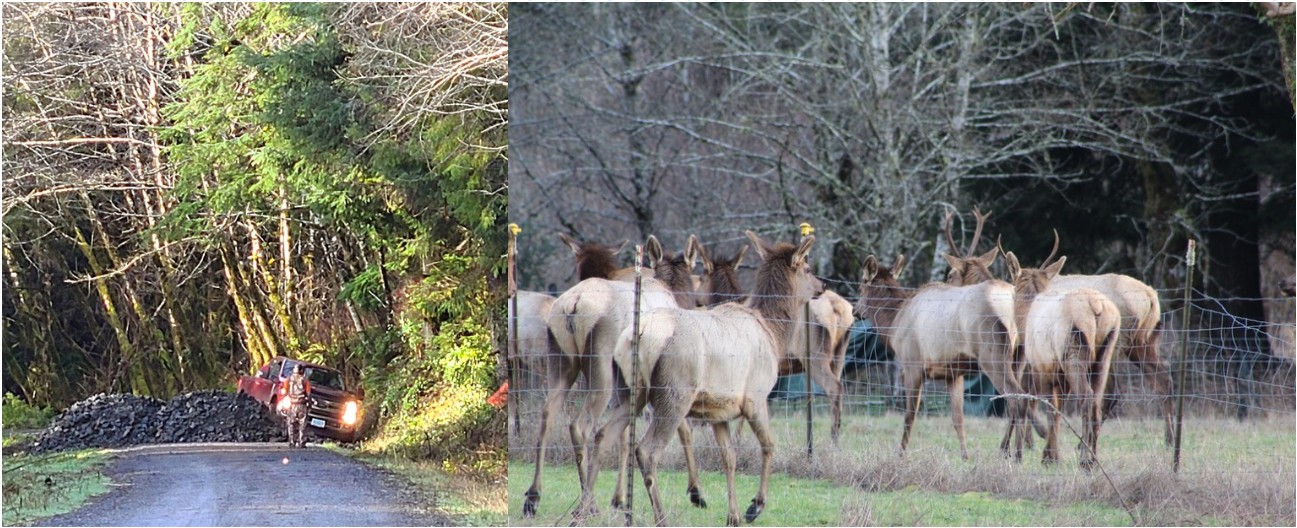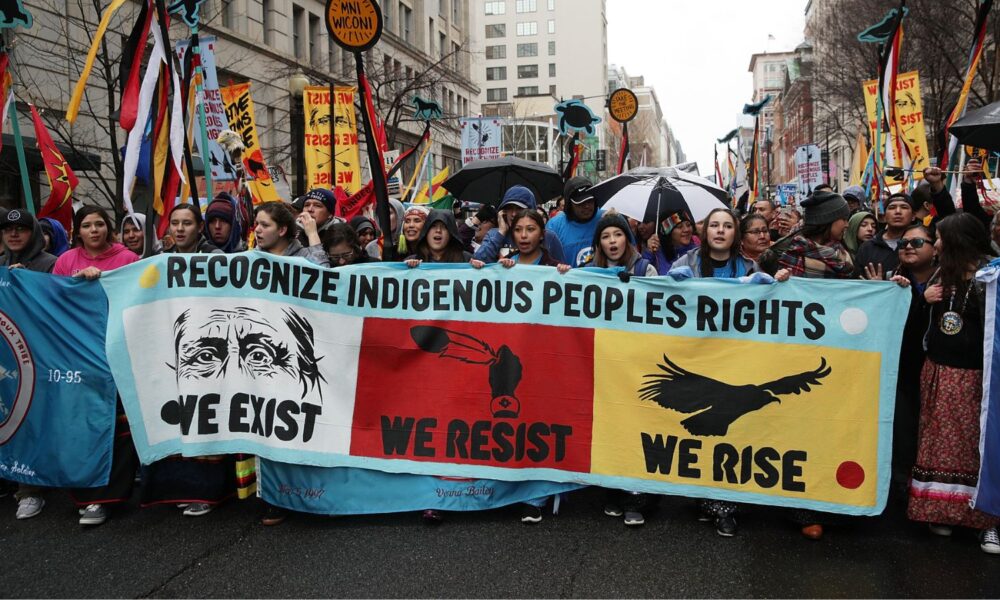There is an abundance of Native American imagery in the US imagination, and much of it is inaccurate: The Western films depicting cowboys winning against local Natives, Wild West TV shows, the classic tear rolling down the cheek of a man in a headdress as he looks at litter, or the picturesque images as Disney’s Pocahontas sang about all the colors the wind holds.
Some of the concepts about Native Americans that many non-Native people possess are rooted in stereotypical portrayals from the media. These concepts were crafted hundreds of years ago and codified in the Declaration of Independence, which calls us “merciless Indian savages.” Because of these propagandized portrayals routinely woven into the mainstream, the stereotypical imagery of Natives has been challenging and nearly impossible to correct.
This imagery has been exploited, propagandized, and weaponized regularly without responsibility or accountability, even as Native communities work tirelessly to continuously debunk falsehoods. These are not just old-school representations that don’t apply today. I was once asked by a judge in court how often I drank alcohol. When I responded that I don’t, he asked me, “Well, what kind of Indian ARE you?” I responded that I prefer to be outdoors, and be active. He replied, “Oh, so you’re that kind of Indian.”
It’s important to realize that there are no positive stereotypes; all stereotypes lead to a generalized assumption, and an unrealistic, erroneous expectation that leaves members of certain groups pressured and then villainized or persecuted for behaving unstereotypically—which is so harmful when the stereotypes were inaccurate in the first place. Stereotyping omits the possibility of variability and choice among the stereotyped group.
The “Ecological Native” stereotype persists and harms
In my opinion, one of the worst and most exploited of all the stereotypes is that of the “Ecological Native”: This stereotype rests in the belief that Natives are connected to the land, inextricably and mysteriously—almost magically. To be fair, some of us are connected to our land, and it has nothing to do with magic. And others are not, which doesn’t mean they are any less a part of Native American communities. Each of us still make up the collective People; each of us contributes our talents, skills, and gifts.
Personally, I have been an outdoor-loving child ever since I can remember. I happened to understand and learn Traditional Ecological Knowledge (TEK) without effort, and carry on sustainable practices that have been in our family since time immemorial. I also have family members who don’t like to go outside, who can’t tell what weather patterns are coming, when to gather, or when fishing season is. The danger of stereotyping resides when someone in a position of power, such as a government agent, business person, consultant, academic researcher, or nonprofit administrator, expects a Native person not skilled in environmental areas to offer information. Assuming that individuals are skilled in an area that they are not, based only on stereotypes, is dangerous. We don’t all know the same information, hold the same ideals, or have the skills and ability to produce information upon command. Situations like this become perilous when we are “asked” while expectation and pressure are embedded in the “request.”
Requests arrive from people or government agencies, and other places that want to validate information or prove inclusivity by incorporation of TEK, and by extension a Native individual. Even if someone who is contacted wishes to say no to such requests, our history of Native peoples across this land is rife with dangerous interactions and being punished to varying degrees for such refusals. Some people may even feel that if they refuse, or if they don’t live up to “Ecological Native” stereotypes, they could be fired or replaced.
Relying on false experts is dangerous
Increasingly, we’re seeing people who do not have specific TEK or Tribal knowledge—but claim to—promote themselves as “experts” to those who don’t have any information on how to carefully vet collaborators. These individuals then fall back onto tropes of land connection and meaningless verbiage while taking funding or influencing land management practices while excluding Tribal input. Often, we see non-vetted individuals be awarded contracts and funding over vetted TEK practitioners simply due to the reliance on a learned stereotype that has been exploited.
I receive emails weekly about someone who has contacted a colleague or Tribal member in search of any Native who is expected to then represent the community. This presents a difficult predicament, since some Natives are willing to give talks, but often don’t have the accurate information needed to address the topic at hand. That information is often recorded and presented as fact, and reused as being from a Native ‘expert.’ This leads to inaccurate data, unverifiable information when claiming the inclusion of TEK, and disbelief of and passing over of vetted Native researchers and specialists. This pattern also contributes to discounting Native scientists and scholars who have spent much lengthier periods of time than others specializing in TEK areas.
It is imperative that anyone who wants to include TEK or data from any discipline of Indigenous science be vetted within—and by—Tribal communities and their administrations, rather than by non-Native people who misunderstand who and what vetted Native scientists are and do.
Additionally, the process of incorporation of Native data and select disciplines of Indigenous science must be carefully reviewed and include vetted Native scholars. Reliance on “someone who knows someone who works with a Native” or a Native who is self-proclaimed as a Native Indigenous scientist, is a dangerous, unethical practice.
Misusing TEK affects climate science
As scientists realized that Western science was failing to comprehensively address climate change, they began seeking out TEK as a method of combatting its effects. The Western science community began looking outside itself to alternative ways of knowing, and found that many Natives had been recognizing climate change in various ways while practicing their TEK. Some oral documentation of discussions of initial change goes back as far as the 1950s.
The new awareness of this perspective and our longstanding datasets offered new insight and filled the holes and gaps in the datasets based on siloed information that much Western science is based upon.
Ongoing TEK practices are carefully maintained and recognized through oral documentation by vetted practitioners. These practitioners are then at the mercy of belief systems that do not take into account the complexity of TEK, nor understand the phenology of the land and resources.
Traditional burn systems provide a perfect example:
A common TEK practice along the West coast and other areas of the country was that of annual controlled burns to maintain vegetation, provide healthy systems, and encourage new growth. This encouraged game to return for the fresh shoots, and provided better basketry material. A detailed understanding of the forested areas, how the landscape moved and shifted, and how cool burn fires (with lower heat intensities than wildfires) would move, was common TEK knowledge.
My father can still recount a childhood memory of attending one of the last burns that was done in the Willamette Valley area of Oregon, stretching from just south of Portland through to Eugene. He recalls how those who started the fire had to then hide away for fear of being arrested for “arson.”
This kind of knowledge, and all its benefits, cannot be applied or used by Western science so long as false narratives about Native people, based on antiquated belief systems, are still the norm. This conflict remains, as Western scientists are interested in TEK but also want to cherry-pick topics to apply it to. This is problematic and ineffective because TEK is holistic in practice; understanding the system as a whole is an absolute necessity. Many non-Native scientists working on climate change don’t understand the premise of multi-generational understanding as it applies to scientific knowledge and consequently don’t take our TEK seriously .
And if at the same time they don’t understand TEK, climate scientists also subscribe to the stereotype of the Ecological Native, believing that all Natives hold the key to climate change, that faulty belief will perpetuate the issues of climate change that we all face. This is wasting time and when time is wasted it threatens our communities as well as verifiable science, both Western and Indigenous.
Painting the issue of climate change, or any other issue for that matter, as “solved by Indigenous science” is like calling John Wayne movies accurate.
A cruel irony for TEK practitioners
On top of all of the intentional, irreparable, and ongoing harm done to Native peoples, for those of us who are blessed enough to retain and attempt to maintain our TEK, the cruel irony is that many of our homelands and natural resources—where we gained this knowledge— have been stolen, destroyed, and/or privatized. We are often barred from the areas where we hold U&A (usual and accustomed) rights to, and we are inundated with procedural blockades designed to keep us from access when we do seek to access homeland areas and resources. These obstructions come from federal, state, and local agents who gatekeep—often quite literally.

Furthermore, the sustainability measures—like traditional burns, the ability to utilize sustainable methods of monitoring species health such as eels, salmon, or deer, or to ensure native plant species’ growth in traditional homeland areas—that we have fought for, reclaimed, and that have been left in our care to protect and be protected for at least seven generations into the future are often at risk of being blocked by some type of bias. As community members, we all know someone whose hunting, fishing, plant, medicinal, or other resource collections were confiscated, whose permit forms were “lost,” or who arrived to find the forest gates locked when they were assured they would be unlocked. This can result in missing the run, a failed hunt, or plants withering preventing harvest collections. This then throws off the sustainable TEK practices we work diligently to uphold and maintain.
Many of the follow-up conversations on situations like these and others that involve sustainability practices of TEK include responses from non-Natives in legal, agency, business, and community sectors who are clearly operating from stereotypical beliefs they hold against Natives. For example, my Tribal community members have told me they have heard inaccurate statements about themselves in these types of situations, such as that they only want to steal resources, or that Natives are “greedy,” that we don’t need natural resources since we have casinos, or that we don’t understand what it takes to manage the areas.
TEK and Western science can co-exist for the benefit of all
Indigenous and Western scientists can co-exist, but in order for this to happen, non-Natives must recognize and set aside their harmful stereotypes of Native peoples, including that we can magically solve climate change. Vetted Native practitioners of TEK must be given the freedom and trust to practice their resource management that contributes to climate change data, without the stereotyping that we will mismanage our lands, or that we don’t need our resources. Indigenous scientists, scholars, and practitioners of TEK cannot collaborate effectively with western science, when stereotypes of Natives persist and perpetuate a bias that interferes with TEK.
Non-natives in positions of power must stop viewing outreach to just one unvetted, non-expert Native person as a quick fix for their projects and initiatives, and instead seek input from Native communities, especially those that will be most affected by whatever policies or solutions they’re working on. And Native practitioners of TEK must be given the freedom and trust to practice their resource management, without the stereotypes that we will mismanage our lands, or that we don’t need our resources.

